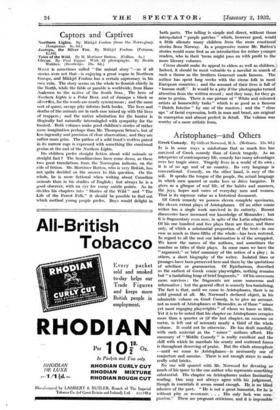Captors and Captives
Northern Lights. By Mikkjol Fonhus (from the Norwegian).
• (Longmaus. 8s. gd.)
WHAT is sometimes called " the animal story "—as if all stories were not that—is enjoying a great vogue in Northern Europe, and Mikkjel Fonhus has a certain supremacy in his own vein. The story seems on the whole to flourish chiefly in the North, while the fable or parable is worldwide, from Hans Andersen to the naive of the South Seas. The hero of Northern Lights is a Polar Bear, and of Jaampa a black or silver: fox, for the words are nearly synonymous ; and the same sort of queer, savage pity informs both books. The lives and deaths of the animals are in each ease mixed up with th$ lives of trappers ; and the native admiration for the hunter is illogically but naturally intermingled with sympathy for the hunted. Both volumes make good children's stories of 'rather more imagination perhaps than Mr. Thompson Seton's, but of less ingenuity and precision of close observation; and they are rather more grim. The pathos of a wild beast's restless patrol in its narrow cage is expressed with something like emotional genius at the end of the Northern Lights.
Do children prefer straight fiction about wild animals or straight fact ? The Scandinavians have come down, as these two good translations from the Norwegian indicate, on the side of fiction. Mr. Mortimer Batten, who is very British, has not quite decided on the answer to this question. On the whole, he is more fictional when writing about' Canadian animals than in his studies of English ; but always he is a good observer, with an ey.c for many subtle points. As he divides his chapters into " Stories of the Wild " and " The Life of the Forest Folk," it should be possible to find out which method young people prefer. Boys would delight in
both parts. The telling is simple and direct, without those. interpolated " purple patches " which, however good, would a little alienate many children from the more emotional stories from Norway. In a progressive course Mr. Batten's stories would come first as an introduction for rather younger. readers, who in their 'teens might pass on with profit to the more literary volumes.
Circus should make its appeal to elders as well as children..',. Indeed, it should be most valuable to a novelist in search of such a theme as the brothers Goncourt made famous. The author has spent long weeks with the circus folk in most European countries ; and the account of their lives is full of "human stuff." It would he a pity if the photographs turned attention from the written record ; and they may, for they go_ near to genius. There is one picture of " White and coloured . artists at housewifely tasks " which is as good as a famous " Dutch Interior 7 by one of the masters ; and the " close ups " of facial expression, both in man and beast, are original in conception and almost perfect in detail. The volume was worthy of a more artistic form,






































 Previous page
Previous page